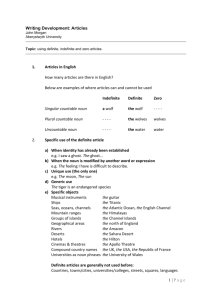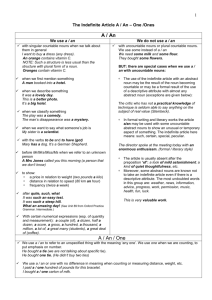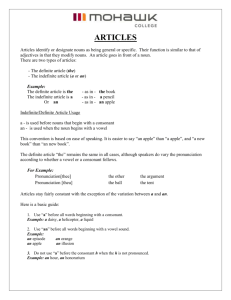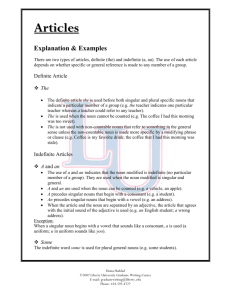Lecture 1:
advertisement
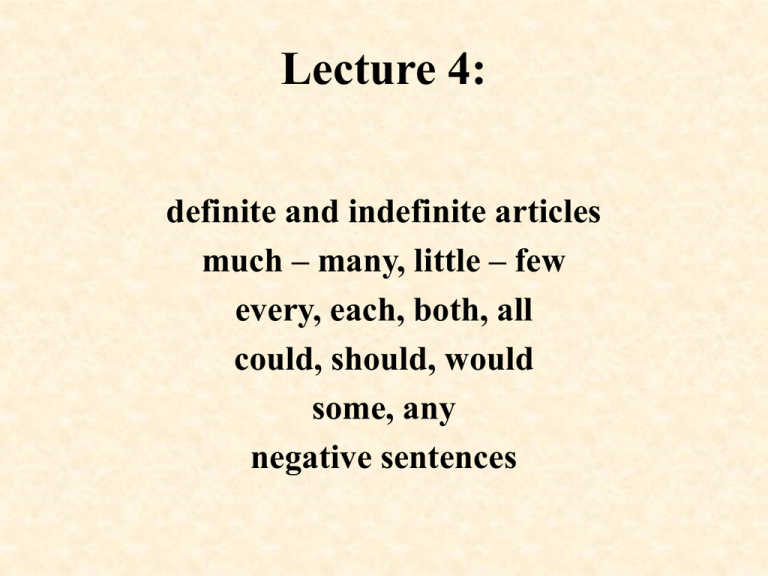
Lecture 4: definite and indefinite articles much – many, little – few every, each, both, all could, should, would some, any negative sentences Definite and Indefinite Articles Indefinite article used in the sense of “nějaký” (the first occurrence of noun): • He has bought himself a new digital camera. • There is a loose screw on the chassis. • A man came up to me and asked me for a light. • The controller houses a USB socket. • He passed me a diskette and told me to install the program it bore. • He’ll be able to open the file. He has a computer. Definite and Indefinite Articles Definite article used: i. if a noun refers to something that is contextually defined, implied or simply given: • He was given a new monitor. A fortnight later he found out the monitor malfunctioned. • The program you were talking about a while ago does not run under Windows. • Take the bloody keyboard and leave me alone! Definite and Indefinite Articles Definite article used: ii. if a noun represents somebody or something of unique character: • The sun was shining all day long. • I met the President of the Czech Republic. • The Prime Minister hopes the situation gets better. • The truth is he hates command-based operating systems. Definite and Indefinite Articles Definite article used: iii. if the speaker, using an adjective, intends to refer to a group of people sharing a certain quality denoted by the adjective : • The young always know best. • Computers can help the disabled a lot. • The chronologically disadvantaged are often senile. • The blind can make use of screen readers. Definite and Indefinite Articles Definite article used: iv. if an expression represents a proper name containing a noun that can stand on its own: • He visited the Tate Gallery last week. • The Prague Castle is a popular site sought after by foreigners. • The Czech Republic has the population of 10 million. • The United States attacked Iraq. v. in the Ukraine, the Hague, the Netherlands Definite and Indefinite Articles No articles used in front of: i. names of days and months: June, Thursday ii. names of people, cities and countries (except those containing nouns that can stand on their own): Peter, Russia iii. names of languages: English, American, Czech iv. nouns denoting meals: lunch, breakfast, supper v. names of sports: tennis, squash, swimming Note: No indefinite articles used in front of uncountable nouns!! Much – Many, Little - Few much + uncountable noun (usually in questions and negative sentences): • How much money have you got on you? • There isn’t much data to download. many + countable noun (usually in questions and negative sentences): • How many students study conscientiously? There aren’t many of them, are there? In positive sentences, there is a tendency towards using a lot of or lots of in front of both countable nouns and uncountable ones. Much – Many, Little - Few little + uncountable noun: • He gave me too little information for me to do anything about the situation. • As a university teacher, he earns very little money. • He earns less money than me. few + countable noun: • Only few programmers work like that. • He brought too few girls to the party for the boys to have fun. • There were fewer clusters damaged than I had expected. Much – Many, Little - Few a little + uncountable noun (meaning “trochu”, “nějaký“): • There is a little water in the glass. • Could you bring me a little sugar? a few + countable noun (meaning “pár“): • There are a few CDs lying on the table. • The source code had a few bugs. Every, Each, Both, All everybody, everything, everywhere, every time: • Everybody knows such a thing. • I was looking for my glasses everywhere. each (often with of): • Each of these cables has no shielding. • Each of these sites has some pornographic content. • Each of them sits in front of their computer by day and night. Every, Each, Both, All both, both of: • Both my girlfriends don’t want me to find myself another one. • Both the CDs are scratched. • Both of these images have the same resolution. all, all of: • All programs written in C don’t work properly. • All of the programs written in C don’t work properly. Could, Should, Would • Could you please attach the cable to the card? • Could you stay away from that device? It might kill you. • We shouldn’t delete the files without knowing what they contain. • Programmers should keep to these syntactic rules. • I would buy the program if it were not so expensive. • Would you be so kind as to debug the source code for me? Some, Any • Bring me any anti-virus software you can lay your hands on, please. • Would you like some assistance? (polite offer) • I kept the initialization file somewhere else. • You can take it anywhere you want. • Don’t tell anyone else, please. • I cannot lend you any money for I have none. Negative Sentences • He has asked no one about that yet. He has not asked anyone about that yet. • He hardly ever uses that type of variable, does he? • He can hardly understand what I am talking about. • None of the disks is large enough to store so much data. • Which of them do you prefer? None, I am afraid. • No girl can ever fully satisfy my needs. That’s why I have the virtual one. Note: Negative sentence in English always contains only one negative expression!! Homework Angličtina pro jazykové školy I: • p. 191 exercise 35.7 • p. 193 exercise 36.4 • p.204 exercise 38.7 • p. 205 exercise 39.4 Specialist Reading: • Decision Tree Classification
